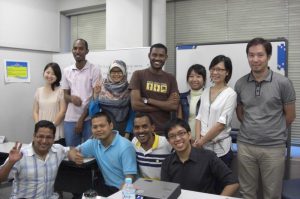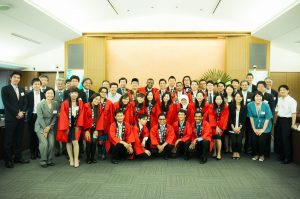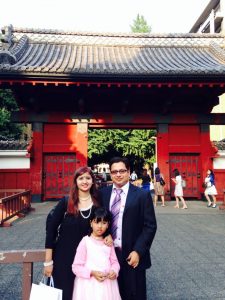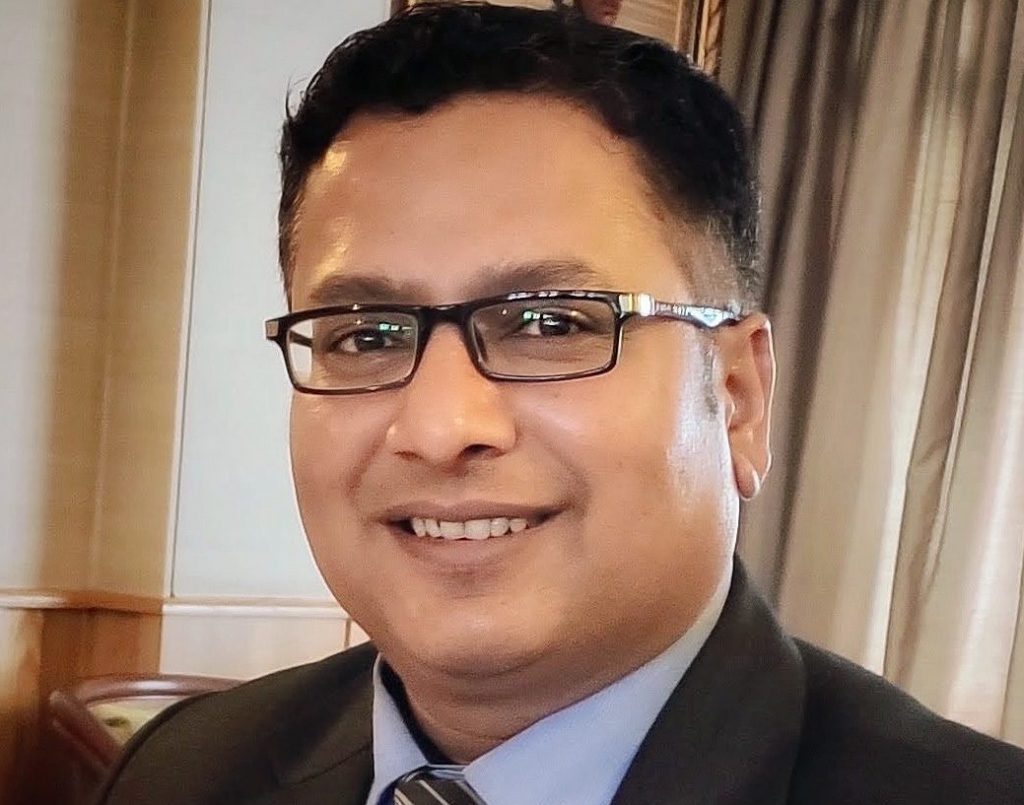Long-held dream of visiting Japan was made true by entering GraSPP
Japan has been my dream destination since my childhood. I recall my father bringing home a calendar featuring captivating scenes of Japan, which left an indelible impression on me. The country’s fascination grew stronger as I delved into articles, news, and TV programs showcasing Japan’s rich history, profound culture, and technological advancement, particularly its remarkable recovery from wartime devastation.
I completed my education in Nepal, but my ambition for further education remained unfulfilled. In 2004, I assumed a governmental role in Nepal, and four years later, I was thrilled to be chosen for a foreign training program – an opportunity that led me to Tokyo. I stayed in Ichikawa city and explored Tokyo’s surroundings with international peers. Although being away from home was challenging, my determination to immerse myself prevailed. As a part of the training program, I had an opportunity to bond with a Japanese family, deepening my connection to the country. I left Japan with a resolve to return.
Back home, I continued my work. A few years later, I researched Japanese universities and scholarship programs. My professional focus on policy matters led me to discover the Master’s Program in Policy Study at GraSPP, which aligns perfectly with my career goals. I applied promptly upon learning about it.
 In May 2012, I embarked on another short-term training program in Japan. Shortly after arriving in Tokyo, I received an email from GraSPP confirming my successful document screening and received an invitation for an interview at the Hongo Campus. Despite the demanding schedule of lectures, coursework, and daily commutes through the bustling Shinjuku station, my determination held firm. Even though homesickness crept in, the interview’s positive outcome solidified my path. I was selected to join the MPPIP with the JJ/WBGSP scholarship, turning my long-held dream into reality.
In May 2012, I embarked on another short-term training program in Japan. Shortly after arriving in Tokyo, I received an email from GraSPP confirming my successful document screening and received an invitation for an interview at the Hongo Campus. Despite the demanding schedule of lectures, coursework, and daily commutes through the bustling Shinjuku station, my determination held firm. Even though homesickness crept in, the interview’s positive outcome solidified my path. I was selected to join the MPPIP with the JJ/WBGSP scholarship, turning my long-held dream into reality.
Diverse range of courses and supportive environment encouraged my life as a graduate student
The period I spent at GraSPP stands out as one of the most beautiful chapters in the story of my life. It was a time when I felt a sense of distinction, as I had the privilege of attending the same university where the former king, Birendra, pursued his higher education. The faculty consisted of exceptionally accomplished professors with inspiring academic and professional backgrounds. The diverse range of courses available, coupled with the innovative teaching techniques employed, fostered a genuinely educational environment. The staff members and my friends from various cultural backgrounds were supportive, which I believe are essential elements in any esteemed institution. GraSPP encompassed all of these qualities.

However, the age difference between myself and most of my fellow students did lead to occasional moments of discomfort. I was 34 years old at that time, living with a charming 4-year-old daughter and a wonderful wife. Carrying my backpack, I took on the role of a graduate student, navigating between classrooms, rushing to train stations and the school buildings daily, and being busy meeting project deadlines. Some of the mandatory courses were utterly new to me and proved to be challenging to comprehend. Nonetheless, I exerted my utmost effort and remain deeply grateful to all the educators, friends, and staff who supported me during that time.
Most of the courses encouraged me. One of the standout features of GraSPP was the ability to choose courses aligned with my interests and capabilities. Several courses were particularly relevant to my career as a policymaker. Among these were “Analysis of Japanese Economic Policy Making Process” by Professor Ryozo Hayashi, “Population Aging and Generational Economy” by Professor Naohiro Ogawa, “Politics and Public Policy” by Professor Kentaro Maeda, “Global Governance” by Professor Yves Tiberghien and “International Political Economy” by Professor Nobuhiro Hiwatari all of which I selected. Professor Ryozo Hayashi left a lasting impression on me. With his prior experience in the government, he possessed extensive knowledge of both practical and theoretical aspects of public sector policy formulation. I took two courses under his guidance, and it’s an honour that he also agreed to supervise my research paper. Another unforgettable experience was the course “Institutions and Methods of Health Technology Assessment in Healthcare Policy” by Professor Isao Kamae. Given my country’s deficient healthcare policy, I chose this course to understand the Japanese healthcare system better. Remarkably, the professor designed the course to include visits to three European countries, offering insights into their world-class healthcare systems.
Japan’s unique cultural lessons provide a profound learning experience

Japanese society markedly differs from others globally, placing significant value on discipline and social cohesion. Studying in Japan entails more than just acquiring a world-class education; it presents a unique opportunity to grasp Japanese approaches to familial, societal, and national organization. Despite being an outsider (“gaijin”), one may feel solitary but never insecure. Every Japanese citizen’s integrity, discipline, and diligence provide a profound learning experience.
The significance of even the most minor actions is deeply rooted in Japan. I recall when a convenience store staff hurriedly returned coins we had left in a photocopier weeks earlier. This display of honesty left us astonished. Near my residence, there were farm areas with vegetable huts lacking attendants. People could freely take vegetables and leave payment in a box, a trust-based system—examples like these provided lessons more valuable than those from any academic institution.
GraSPP and the University of Tokyo have profound significance in my life. The knowledge I gained there continues to directly and indirectly benefit my professional and personal life. While information and knowledge can be sourced from various outlets in this digital age, my experience of studying in Japan was distinctive. Understanding Japanese ethics, morality, and values requires immersion in the country.
Proud of having been a GraSPP student― Vivid memories and worldwide connections remain

Another positive aspect was the pride of being a student at the University of Tokyo. When I introduce myself as a “Todai no Gakusei” to Japanese individuals in my home country or abroad, their reactions are filled with respect and surprise. It brings me immense satisfaction to have chosen GraSPP for my higher education. Even nearly a decade after my time at Todai, I vividly recall every moment. The classrooms, professors, staff, my fellow students, Yasuda Auditorium, Akamon gate, library, cafeteria, convenience stores, Sanshiro Pond, vibrant trees, captivating Parks, Yushima station, Chiyoda line, bustling crowds, tightly packed trains, visually appealing and delectable cuisine, snowfall, cherry blossom season, and “Hanabis”—all these memories remain vivid.
Enrolling in GraSPP means more than being a student; it means joining an extensive family. Through this journey, you forge connections with people from diverse corners of the world, and GraSPP actively supports cultivating and strengthening these bonds. In this context, I acknowledge Professor Toshiro Nishizawa, who demonstrates genuine concern for his former GraSPP students. He consistently inspires us alumni to reconnect, regardless of how long we’ve been apart. His presence during his visits to Kathmandu for information sessions has always been a delightful experience. Furthermore, staying connected is facilitated through regular bulletins, program updates, and alumni gatherings.
In summary, Japanese universities prove to be a compelling choice for those seeking a higher education experience that offers an alternative academic and social perspective. Additionally, if one’s career aspirations involve public policy, I wholeheartedly recommend GraSPP as a top choice.



